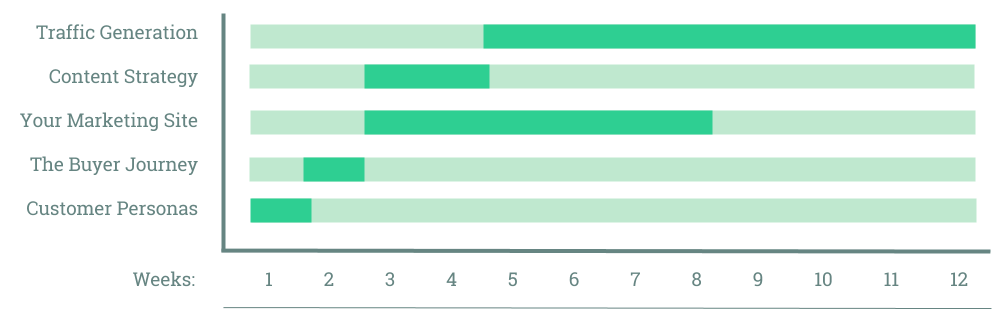Ready to make that big marketing push?
Your business needs a jolt of energy, a boost in traffic, and an increase in sales and revenue. Don’t we all!?
But really, what you need is a sustainable marketing system that can fuel your growth for months or years to come. In order to achieve this, you’ll need to lay the groundwork with a firm marketing foundation.
That’s why we developed the 90-Day Digital Marketing Plan.
This ebook and resource pack will guide you step-by-step as you put each of the essential building blocks of your marketing plan into place.
Whether you’re launching a new product and you need to make that first big push to start building your customer base, or you’re an established company that is ready to drive its next phase of growth, our 90-Day Digital Marketing Plan is designed to get you there.
Why do most “marketing plans” fail?
The truth is, many marketing plans either fail completely or just don’t produce the results the company was hoping for.
Why?
Well there are a number of reasons we can point to, but key among them would be;
- It wasn’t a good plan in the first place
- The plan was good but wasn’t well-executed
- Maybe it didn’t really fail – perhaps it wasn’t given a chance to succeed
One big culprit that leads to a poor plan is not understanding the target audience well enough. It’s a core requirement of attracting the right people to your business that you understand who they are, which is something we go over in Your 90-Day Marketing Plan.
Without creating a good foundation by laying the groundwork and understanding your audience, you will run into problems like having a poor content strategy or ineffective traffic-driving efforts.
Execution is another important aspect to seeing success from a marketing plan. For example, content marketing might be the plan, but do you have all the pieces in place to make that strategy work?
Lastly, setting realistic goals is important. You have to know what you want out of your marketing plan so you can measure, track progress and make any adjustments as needed. Have some idea of what a realistic timeline looks like for your particular plan – strategies like content marketing are not overnight success stories.

Why 90 days?
It’s a fair question: Why pick 90 days as the timeline for a digital marketing plan?
We found that 90 days tends to be a reasonable timeline for most companies to put some strategies in place and start to gain traction. It’s in that “not too long yet not too short” timeframe and gives you some impetus to get moving, yet without feeling that you’re trying to cram too many things in.
We like the principle of “time boxing,” which a 90-day plan encourages, meaning that you focus on time instead of tasks. You allocate a certain amount of time to each activity then use only this time to get the task finished.
This helps to ensure that you devote enough time to doing something well, but not so much that you end up trying to over-engineer solutions. You can put your marketing plan onto a calendar and safely complete each item effectively within the 90 days.
Who is this marketing plan for?
The great thing about our digital marketing plan is that it can be broadly applied to a number of different businesses. Here are a few examples:
- Any business that relies heavily on an online presence to attract customers
- SaaS and software companies
- Ecommerce businesses selling physical products can adapt this plan to whichever channel they sell through
- Training or digital products companies
- Other B2B or B2C companies can adapt it to their needs
The goal is to go through the different phases to build a strong and integrated marketing plan that will set you up for long-term results.
While our guide is intended to be “step-by-step”, the truth is, every phase we discuss should be revisited throughout the lifetime of your product and marketing work. While you may tackle the foundation one piece at a time, the timeline of how you think and strategize around each component should look more like this:

What we cover in the marketing plan
Let’s take a quick look at the various components of our 90-Day Digital Marketing Plan:
Week 1: Defining customer personas
As mentioned, one pitfall that can lead to a failed marketing plan is neglecting to define your audience beforehand. You have to know where to begin when your marketing feels “stuck” and it always comes back to having a clear understanding of your target audience. What are their goals? Their pains? Their basic demographics?
Defined customer personas make the rest of your marketing plan possible. They act as a guide to determine what you write along with how and where you reach the right people.
Week 2: The buyer journey
The path to a customer buying from you is rarely linear. If you’ve ever felt that you’re having a hard time reaching and engaging with customers or that when you do engage, they don’t buy, there’s a good chance that you need to pay attention to what stage they are at in the buyer journey.
Different stages of the buyer journey will map with the different sections of your sales funnel and in turn, the journey can be mapped to specific marketing activities for each stage. You need a fundamental understanding of this so you’re not inappropriately pushing certain marketing material at people when they’ve either moved beyond it or aren’t ready for it.
Weeks 3-8: Your marketing site
You can have a beautiful website, but if it’s not driving conversions then it’s virtually useless to your business. You need a strategic approach to optimizing the design and structure of your website so that it helps you to achieve your goals.
We explain why we feel that companies should optimize for the bottom of funnel first – because none of your marketing efforts through the other stages will matter one bit if you can’t get people to convert at the end. We also look at 5 key optimizations you can make on your website to give yourself a solid base to work from.
Weeks 3-4: Content strategy (and 5-12: Content execution)
You’ve probably tried content before. It either kind of worked, didn’t work at all or, you’re not sure whether or not it has worked. Perhaps for one reason or another you had trouble sticking with it (who doesn’t – there are so many things to get done in a business!)
Content marketing is about having a good strategy that is designed for your target audience, followed by a system to sustain it for the long haul.
Content should not only be interesting and provide value to the reader, it should be a way to attract and actually capture your audience. There should always be an opportunity for them to sign up to your email list in return for some kind of extra value that they will receive, which is why we like the strategy of using content upgrades.
Weeks 9-12: Traffic Generation
Now that you’ve laid the groundwork to attract the right audience, it’s time to get out there and find them! What you’re looking for is sustainable, long-term traffic generation rather than just a few short-term spikes.
This means using organic, repeatable strategies that can be relied on month after month to generate the traffic you need.
“Hustle” isn’t the way to drive sustainable traffic, but building reliable systems is a good solution. These include internal and external traffic systems, SEO, and paid traffic. That content you’ve been busy creating needs to be put to work and promoted out there. We look at 5 systems to increase your organic traffic in our plan.
What happens after 90 days?
We’re confident that by building your strategy in each of the areas we cover in the 90-Day Digital Marketing Plan, you’ll be in a good position to see results…
… but of course results come with consistent application.
With the engines now built, you need to keep running them and ensure they’re maintained. This means assessing how your strategies are going, ongoing planning along with the measurement and adjustment of execution where necessary.
This is all made simpler by using a good tool to help with monitoring and automating your processes and workflows. We feel that Ops Calendar fits the bill well here and will help to ease your marketing headaches.
With features, such as smart social media organization, assigning of tasks to your team, monitoring their workload, planning content calendars and measuring of results, it’s a one-stop-shop for the efficient management of your marketing plan.